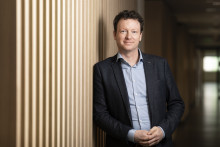What is the ECIU University Vision 2030 and why was it created?
Sander Lotze: ‘It is the North Star for all our activities. It guides us towards where we’d like to end up in 2030. It constantly reminds us of what our priorities are, what to focus on and what is to come after the three year pilot we’re currently in. Second reason to create the Vision was to make sure that we align our activities with visions of all the member universities. Last but not least, we need to communicate our long-term goals with the European Commission.’
What did the process of creating the Vision look like?
Heli Harrikari: ‘In June 2020 we met up with the ECIU Executive Board and discussed main principles for the Vision. After the summer, we got together and spent several days talking and brainstorming. We created several versions of the Vision, some more ambitious than the final one, some less ambitious. After each version, we received feedback from the Board and ended up with the current version, which is on the more ambitious side of the spectrum.’
Sander Lotze: ‘In the process, we also interviewed all Board members individually to reflect on the content. We wanted to get the feeling of where the individual universities and their high management wanted to go. Plus, it was a good way to stay connected during the lockdown.’
What are the key elements of the Vision 2030?
Heli Harrikari: ‘The core idea is that we are not mimicking a traditional university. We are aiming to create a new European ecosystem for solving multi-disciplinary societal challenges, doing research and learning for life. As the Vision states, the main building blocks of the ECIU University are: open community, cutting-edge technologies, innovative co-creation model and European education and research.’
Sander Lotze: ‘Indeed, we are not here to replace or replicate traditional universities. Education and research are only one of our core tasks. Yes, we aim to educate, but we look at it from a different perspective. We aim to create a collaborative ecosystem where universities are key players.’
Can you name the main goals that the ECIU University wants to reach by 2030?
Heli Harrikari: ‘We want to offer learning opportunities, to have a Europe-wide ecosystem where people can come for individual learning pathways. Our focus lies on building a European community where people can join together and find opportunities. It is not about a university sitting somewhere, it’s about people coming together. We hope to lower the traditional organizational borders. We want to create space where people can move freely and gather around solving challenges, not worry about which organization they belong to.’
Sander Lotze: ‘In this sense, the ECIU University has more of a facilitating role, rather than educational.’
Are there any hurdles for achieving these goals?
Sander Lotze: ‘Absolutely. Firstly, there are practical hurdles such as creating a new legal entity. European university is concept that doesn’t exist yet. We need to make sure everyone understands what it’ll be built on and where we are going with it. The ECIU University has all characteristics of a start-up, but it is a lot more complex.’
Heli Harrikari: ‘We have set out goals that would be difficult to achieve even in one country but we are dealing with different national systems. Sometimes we wonder – what the heck were we thinking?’
Sander Lotze: ‘That is true. However, we all honestly believe in this university. This is not just some project for us, we really believe that this is the way forward. And every day we hear that others also believe this is the way to go.’
Heli Harrikari: ‘Exactly! We know that we are going in the right direction.’
Sander Lotze: ‘The next step is to move from vision to strategy and then to execution. This will be a lot of work, but – in a way – it will also be easy. Thanks to creating the Vision 2030, we now know which steps we need to take.’







